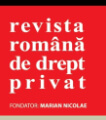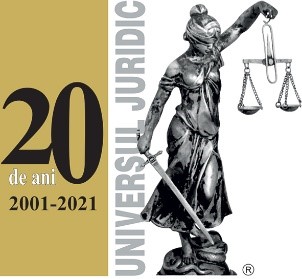Abstracţiunea reprezentării voluntare şi funcţia circulatorie a actelor
dapopescu[at]law.ubbcluj.ro
Cuvinte cheie:
abstraction of the power of representation, representation, contract of mandate, power of attorney, falsus procurator, rules of conflict, law applicable to the contract of mandate, law applicable to the power of attorneyRezumat
This study focuses on the institution of voluntary representation, its origins and the abstraction of the power of representation being examined. It contains broad references to comparative law (especially the German comparative law), but moreover, implications in the field of private international law.
Perhaps the institution of voluntary representation had the most troubled history, from its non recognition and up to its enshrining and development in its various legal forms, as it has been affected by numerous controversies over time. The theories which have been outlined in the course of its long history bear witness to this end. As Hijmans van den Bergh suggestively noted, it “has been rather a mountain climbing school for jurists of all countries for several centuries” („Ç’est plutôt une école d’escalade pour les juristes de tous les pays et de plusieurs siècles”). Voluntary representation has entered the field of private international law with all these theories and controversies, which have not yet been fully elucidated at the national level. This led to the fact that, despite the unification efforts at the European level, the power of representation be excepted from the scope of the Rome I Regulation [art. 1 para. (2) letter g) of the Regulation]. As it is different from its originating document (mandate contract, power of attorney, commission contract etc.), the judicial power of representation remains outside its applicable law, as it is subject to the law appointed by the national rules of conflict. When they are missing (in certain codifications, such as the Romanian one), things get more complicated. The person in charge of the settlement of law conflict shall be forced to fill the gaps (Lückenschließung), following certain logical and judicial judgments, taking into consideration the specificity of the aimed institution – as the power of representation is in this case (Vertretungsmacht), an institution which, as we have noted, is explicitly excluded from the field of the Rome I Regulation, however, which does not find any explicit rule of conflict in the national codification either – , as well as the scope and purpose taken into account by the legislator in the establishment of the rules of conflict. This is what it is called the method of covering the gaps of legal rules (Lückenfüllungsmethodik). Therefore, as we do not have any rule of conflict especially intended to the power of representation, we shall refer to the rules of conflict provided for in our Civil Code, art. 2637 et seq.
The power of attorney, as a unilateral legal deed, cannot be invariably considered a contracting offer, which, due to its use, might result in the conclusion of the contract of mandate. In most cases, the power of attorney shall be limited to establishing the content of the power of representation (its conditions, powers and limits), without containing any provision related to the internal causal relationship (Innenverhältnis). That is why, it cannot be compared to any contracting offer. The power of attorney is a title of legitimacy of the power of representation. That is why, it is excluded, as we have noted, from the scope of the Rome I Regulation. The power of attorney is a unilateral deed by which the empowering party does not express its free intent to assume any obligation towards the representative („freiwillig eingegangene Verpflichtung”), as resulting from the case law of the Court in Luxembourg.
Publicat
Versiuni
- 21-04-2023 (2)
- 02-02-2023 (1)









